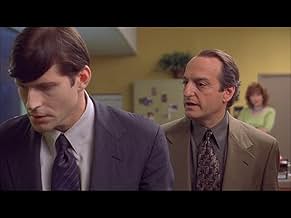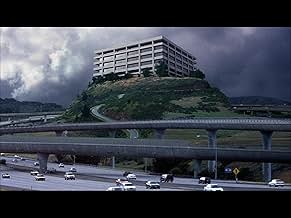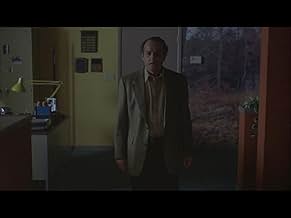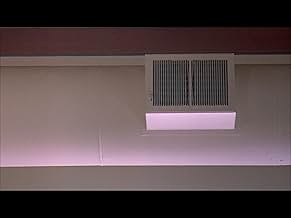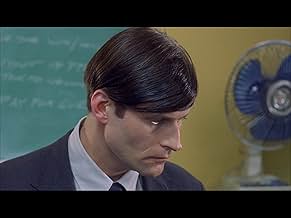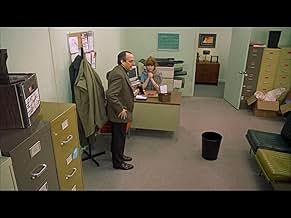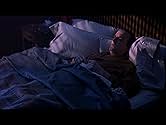VALUTAZIONE IMDb
6,4/10
2304
LA TUA VALUTAZIONE
Aggiungi una trama nella tua linguaA clueless boss has no idea what to do with his mundane office worker whose refusal of duties only gets worse each passing minute.A clueless boss has no idea what to do with his mundane office worker whose refusal of duties only gets worse each passing minute.A clueless boss has no idea what to do with his mundane office worker whose refusal of duties only gets worse each passing minute.
- Regia
- Sceneggiatura
- Star
- Premi
- 1 candidatura in totale
Stu Klitsner
- Professor Bum
- (as Stuart Klitsner)
Catherine DiNapoli
- Rocky's Girlfriend
- (as Catherine di Napoli)
Recensioni in evidenza
The head of a public records office advertises for a new employee. Only one person responds--Bartleby, a former postal worker who at first files like a demon then lapses into apathy. Bartleby stands all day looking at an air vent in the ceiling, responding to every request from his boss and coworkers with, "I would prefer not to." Eventually the boss retaliates with passive-aggressive acts aimed at getting rid of the man. Till the very end, however, Bartleby remains an enigma, a human cipher who refuses to give up his secrets.
Hardly an engaging story premise? That's what I thought when I trudged through Herman Melville's mid-nineteenth century story "Bartleby the Scrivener" in college lit class. Sure, the story has an important theme and some interesting symbolism, but it's also dull, dull, dull. However, director Jonathan Parker has taken the best sort of revenge on this canonical work of American literature; he's turned it into a zany, low-budget, laugh fest--getting across many of the essential ideas while also entertaining his audience. Parker has approached the sort of exaggerated, stale, depressing office atmosphere seen at the beginning of "Joe Versus the Volcano" and turned it inside out, covering it with a colorful, kitschy facade to inflate the absurdity of modern information mills.
Essential to the success of the film is the fine ensemble cast. Crispin Glover deserves more lead roles, and though with Bartleby he does spend most of his time immobile and silent, perhaps no other actor can accomplish more with simple posture, well-manipulated expressions, and quirky movement. Glenne Headly is a scream in her exaggerated seduction attempts aimed at Seymour Cassel. Joe Piscopo is also in fine form as the office macho man, though he has aged dramatically since we saw him last in, what--"Wise Guys"? Maury Chaykin gives the overweight and nerve-racked Ernie a comic flair, playing with his desktop windup toys only to flinch every time they jump, and pulling off an impressive physical comedy scene involving a sandwich, a photocopier, and a watercooler. Finally, David Paymer as "The Boss" provides a solid focus for the film with his adaptive performance of a complex character.
Hardly an engaging story premise? That's what I thought when I trudged through Herman Melville's mid-nineteenth century story "Bartleby the Scrivener" in college lit class. Sure, the story has an important theme and some interesting symbolism, but it's also dull, dull, dull. However, director Jonathan Parker has taken the best sort of revenge on this canonical work of American literature; he's turned it into a zany, low-budget, laugh fest--getting across many of the essential ideas while also entertaining his audience. Parker has approached the sort of exaggerated, stale, depressing office atmosphere seen at the beginning of "Joe Versus the Volcano" and turned it inside out, covering it with a colorful, kitschy facade to inflate the absurdity of modern information mills.
Essential to the success of the film is the fine ensemble cast. Crispin Glover deserves more lead roles, and though with Bartleby he does spend most of his time immobile and silent, perhaps no other actor can accomplish more with simple posture, well-manipulated expressions, and quirky movement. Glenne Headly is a scream in her exaggerated seduction attempts aimed at Seymour Cassel. Joe Piscopo is also in fine form as the office macho man, though he has aged dramatically since we saw him last in, what--"Wise Guys"? Maury Chaykin gives the overweight and nerve-racked Ernie a comic flair, playing with his desktop windup toys only to flinch every time they jump, and pulling off an impressive physical comedy scene involving a sandwich, a photocopier, and a watercooler. Finally, David Paymer as "The Boss" provides a solid focus for the film with his adaptive performance of a complex character.
Don't know if Melville would even recognize his marvelous short story as translated into this film, or even if he'd approve...although I think he might...because the spirit of the original is here.
The satire of office shenanigans as presented by Jonathan Parker brings humor to this rather sad tale of a man determined to bring his intransigent self to the workplace and even to life itself... in the extreme. The overall effect is humane and even when the laughter comes we know something poignant is going on. David Paymer is superb as the frustrated, distraught but empathetic boss who tries to get Bartleby to be a responsive, reasonable worker/person, to no avail. Crispin Glover is a rather ghostly looking Bartleby, in a performance that demands withholding, a difficult task, but one he meets quite well.
This is good entertainment and food for thought...not often the case in movies these days.
The satire of office shenanigans as presented by Jonathan Parker brings humor to this rather sad tale of a man determined to bring his intransigent self to the workplace and even to life itself... in the extreme. The overall effect is humane and even when the laughter comes we know something poignant is going on. David Paymer is superb as the frustrated, distraught but empathetic boss who tries to get Bartleby to be a responsive, reasonable worker/person, to no avail. Crispin Glover is a rather ghostly looking Bartleby, in a performance that demands withholding, a difficult task, but one he meets quite well.
This is good entertainment and food for thought...not often the case in movies these days.
I never heard of this movie until couple of weeks ago when I saw it on TV. This brings my question - where do all the good, "small", independent movies go after they've been created and screened on the Sundance Film Festival? How do we learn about their existence? Where do we read about them? And most importantly, where can we see them?
Bartleby, the first film directed and written by Jonathan Parker is a real gem - modern version of the Melville's short story "Bartleby the Scrivener" with absolutely amazing cast.
Crispin Glover plays Bartleby, the man who was hired, but preferred not to work and who was fired, but preferred not to leave. David Paymer is his clueless boss who tries to understand what he is dealing with. Glenne Headly is Vivian, an office secretary, the woman of many adorable talents; Maury Chaykin, and Joe Piscopo are his coworkers in the one of the most boring office ever existed. The office is located in the building that sits on the top of the hill and comes directly from the El Greco's painting "View of Toledo" with its atmosphere of mystery, danger, and loneliness: Would you like to work in the building like that? I'd prefer not to...
I believe Parker made a very impressive debut - the film is creatively shot, the use of music is amazing - Beethoven's sonata turns into a creepy, quirky and moody Bartleby's theme for which Parker used theremin - very interesting and unique musical instrument. Parker and his co -writer transported 'Bartleby the Scrivener' into a surreal and absurd black comedy - satire on bureaucracy and alienation in the insane and cruel modern world.
Franz Kafka's name came to my mind more than once while watching the film - he would've loved that absurd, funny but dark and sad story. Also, if ever a good movie is made about one of the greatest and tragic writers of 20th Century, Crispin Glover should play him. Just compare their pictures...
Bartleby, the first film directed and written by Jonathan Parker is a real gem - modern version of the Melville's short story "Bartleby the Scrivener" with absolutely amazing cast.
Crispin Glover plays Bartleby, the man who was hired, but preferred not to work and who was fired, but preferred not to leave. David Paymer is his clueless boss who tries to understand what he is dealing with. Glenne Headly is Vivian, an office secretary, the woman of many adorable talents; Maury Chaykin, and Joe Piscopo are his coworkers in the one of the most boring office ever existed. The office is located in the building that sits on the top of the hill and comes directly from the El Greco's painting "View of Toledo" with its atmosphere of mystery, danger, and loneliness: Would you like to work in the building like that? I'd prefer not to...
I believe Parker made a very impressive debut - the film is creatively shot, the use of music is amazing - Beethoven's sonata turns into a creepy, quirky and moody Bartleby's theme for which Parker used theremin - very interesting and unique musical instrument. Parker and his co -writer transported 'Bartleby the Scrivener' into a surreal and absurd black comedy - satire on bureaucracy and alienation in the insane and cruel modern world.
Franz Kafka's name came to my mind more than once while watching the film - he would've loved that absurd, funny but dark and sad story. Also, if ever a good movie is made about one of the greatest and tragic writers of 20th Century, Crispin Glover should play him. Just compare their pictures...
My first reaction to "Bartleby" is that this movie is much like a previous Crispin Glover effort, "Rubin and Ed" about a strange, directionless man with little background, who plods his way through life carelessly. Some of the awkward moments and surreal dialogue and movements within Bartleby seem to be forced, trying to hard, to capture a campy feel. The film doesn't quite reach a campy status though because of this. Although Glover captures his quirky behavior perfectly, from staring at the air vent for hours, to endlessly saying "I prefer not to.." to every work request, and the dynamics of the working relationship with his boss are interesting at times. Joe Piscopo and Maury Chaykin have some strange roles as co-workers who are up to no good... how these guys stay employed are a mystery.
Bartleby has two major problems. One is, it just gets boring. A good slow movie can do and say a lot, but Bartleby just seems to be obsessed more with how weird it can be, how far it can push the surrealism of its cast and the corporate buildings on the hills. Another thing is, why does Bartleby's boss take such an interest in him? What is the motivation? Perhaps this is best explained in Herman Melville's book, from which this movie is based. For a Crispin Glover fan, this is even barely worth watching.
Bartleby has two major problems. One is, it just gets boring. A good slow movie can do and say a lot, but Bartleby just seems to be obsessed more with how weird it can be, how far it can push the surrealism of its cast and the corporate buildings on the hills. Another thing is, why does Bartleby's boss take such an interest in him? What is the motivation? Perhaps this is best explained in Herman Melville's book, from which this movie is based. For a Crispin Glover fan, this is even barely worth watching.
7B24
The film touches on some parts of the original story very aptly. I thought the Chaykin-Piscopo match was very close indeed to what Melville intended. As to Crispin Glover, no other movie actor of his stature is creepy enough and palpably slow-witted enough to fit the role -- not even the younger editions of a Brando or Hopper or Walken, who would overact monstrously in one form or another.
Most viewers seem to surrender to the misconception that the story is all about Bartleby. In fact, the narrator undergoes the most profound change within its context. And in that sense this film version fails because the Paymer character is made out to be a complete sap, rather than the seriously introspective and well-educated man of the original.
No one in 1853 knew anything of co-dependency in relation to addictions and other mental disorders, but Melville was prescient in that regard. The apparent despondency of Bartleby (characterized in the original as late of the Dead Letter Office) has no bounds, but it is in his employer's character we are led to see that this relatively new concept involving an excess of identification with the subject person can result in similar debilitation on the part of the caregiver.
It falls as well into the category of feature-length films based on short stories destroyed by too much padding and extraneous activity we used to call "stage business." It should be as spare as the slowly emptying mind of Bartleby himself.
Most viewers seem to surrender to the misconception that the story is all about Bartleby. In fact, the narrator undergoes the most profound change within its context. And in that sense this film version fails because the Paymer character is made out to be a complete sap, rather than the seriously introspective and well-educated man of the original.
No one in 1853 knew anything of co-dependency in relation to addictions and other mental disorders, but Melville was prescient in that regard. The apparent despondency of Bartleby (characterized in the original as late of the Dead Letter Office) has no bounds, but it is in his employer's character we are led to see that this relatively new concept involving an excess of identification with the subject person can result in similar debilitation on the part of the caregiver.
It falls as well into the category of feature-length films based on short stories destroyed by too much padding and extraneous activity we used to call "stage business." It should be as spare as the slowly emptying mind of Bartleby himself.
Lo sapevi?
- QuizDick Martin's final acting performance.
- BlooperWhen "The Boss" goes to check out a new place for their office, he settles on a place with no electrical outlets on 3 of the walls. (The 4th wall is not shown) There's a Xerox and every desk has a computer. This arrangement would be completely unacceptable for any office manager.
- Curiosità sui creditiBefore the opening credits begin, viewers are given a portrait and short biography of Herman Melville, upon whose story the film is loosely based.
- ConnessioniReferenced in Stargate Atlantis: The Lost Boys (2005)
- Colonne sonorePhantasie #3 In D Minor
Written by Wolfgang Amadeus Mozart (as Mozart)
Background music on piano by Nancy Spottiswoode
I più visti
Accedi per valutare e creare un elenco di titoli salvati per ottenere consigli personalizzati
- How long is Bartleby?Powered by Alexa
Dettagli
- Data di uscita
- Paese di origine
- Sito ufficiale
- Lingua
- Celebre anche come
- Bartleby at the Office
- Luoghi delle riprese
- Azienda produttrice
- Vedi altri crediti dell’azienda su IMDbPro
Botteghino
- Lordo Stati Uniti e Canada
- 148.479 USD
- Fine settimana di apertura Stati Uniti e Canada
- 14.599 USD
- 27 mag 2002
- Lordo in tutto il mondo
- 148.479 USD
Contribuisci a questa pagina
Suggerisci una modifica o aggiungi i contenuti mancanti


